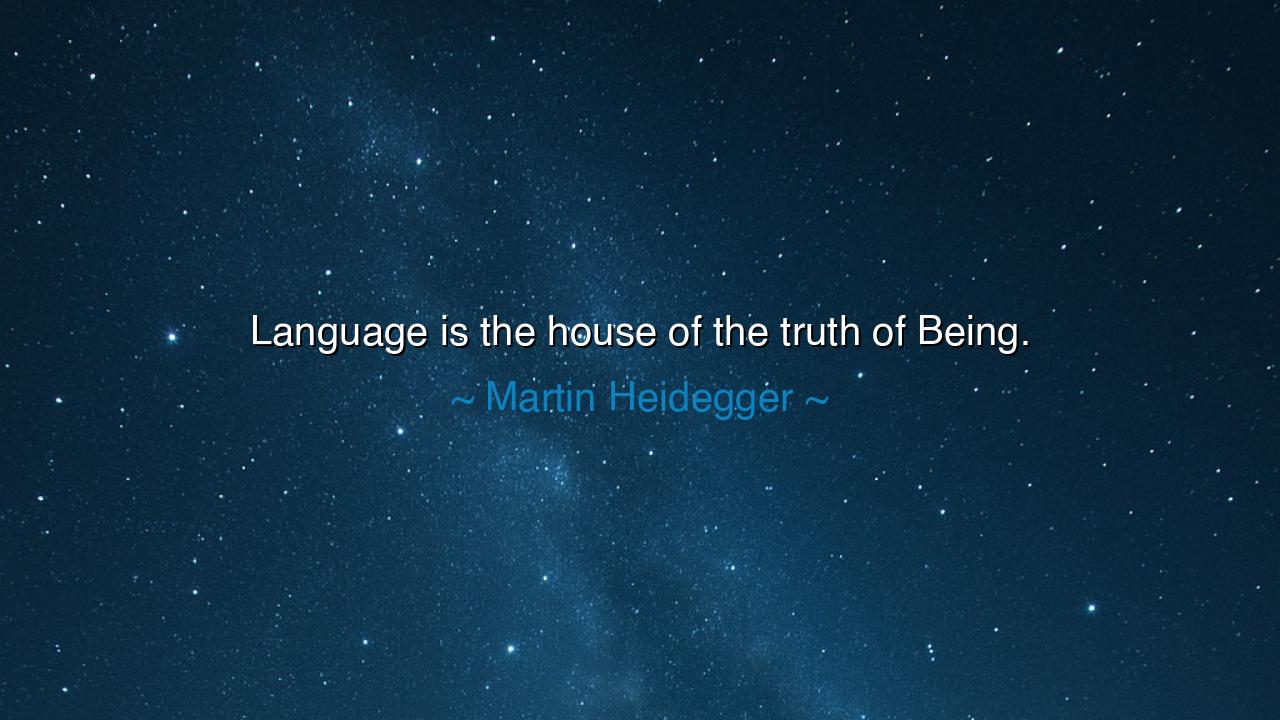
Language is the house of the truth of Being.






Hear the deep words of Martin Heidegger, who sought to unveil the mysteries of existence: “Language is the house of the truth of Being.” This is not a phrase to be read lightly, for it opens a gate into the heart of what it means to exist. Heidegger tells us that language is not merely a tool for communication, nor merely the garment of thought—it is the dwelling place of truth, the very shelter in which Being itself becomes known. Without language, we wander homeless, without ground; with it, we inhabit a house that gives shape, meaning, and light to our existence.
The ancients knew this long before Heidegger gave it form. In the beginning, they said, there was the Word. Out of the Word came creation, for without language there is no naming, and without naming there is no knowing. Language is the vessel through which chaos becomes order, through which shadows gain shape, through which the mystery of Being steps forth from silence. When man first called fire “fire,” he was not merely inventing a sound, but discovering its reality in the house of truth.
Consider the story of the Hebrew prophets. They believed their words carried the breath of the divine, that in their speech the eternal broke into time. Their language did not simply describe reality—it summoned it, shaped it, revealed it. When Isaiah spoke of justice rolling down like waters, he was not just describing a dream; his words made the dream vivid, powerful, alive. His language became the house where people could see and feel truth dwelling among them.
In history, we see this again in the speeches of Abraham Lincoln. At Gettysburg, amidst the graves of soldiers, he uttered only a few words. Yet in that language, a wounded nation glimpsed its Being—a people dedicated to liberty, equality, and sacrifice. The field was already soaked in blood, but Lincoln’s words gave meaning to the suffering. His speech became a house in which the truth of the nation could dwell, shaping the destiny of generations.
Heidegger’s teaching is thus clear: to guard language is to guard truth. When language is twisted into deceit, the house collapses, and men stumble in the ruins of falsehood. When words are hollowed of meaning, the soul wanders in exile. But when language is honored, when it is spoken with honesty, courage, and reverence, it becomes a dwelling not only for Being, but for beauty, justice, and love.
The lesson, then, is this: treat your words as sacred. Do not speak idly, for every word builds or breaks the house of truth. Do not lie, for a lie cracks the very foundation of Being. Speak with care, speak with clarity, speak with heart. Read the words of the wise, that you may strengthen the beams of your own house. Write your thoughts with honesty, that future generations may find shelter within them.
So let your daily practice be one of reverence for language. When you speak, ask: “Am I building a house where truth can dwell? Or am I tearing its walls down?” When you listen, attend not only to the sound, but to the essence that breathes within the words. For if language is the house of the truth of Being, then each of us is both its builder and its guest. Let us build with care, so that the house may stand strong, radiant, and worthy of eternity.






KVKhanh Vo
This quote raises a lot of questions about how we relate to truth through language. If language is the house of truth, does that mean the limitations of language also limit our access to truth? How much of our understanding of the world is actually shaped by the words we use to describe it? Heidegger seems to be saying that truth isn’t something we discover through observation alone, but something we encounter through language itself.
SNEbe siu nhannn
I find it really interesting that Heidegger connects language to truth and existence in such a profound way. If language is the house of truth, then does that mean we are always seeking truth through our words, whether spoken or unspoken? What happens when words fail to capture the essence of our experiences? I wonder if that’s when we feel disconnected from truth—when language falls short of expressing the depth of our Being.
MTPhan Tran Minh Thu
I’m intrigued by the idea that language itself is where the truth of ‘Being’ resides. Does that mean our reality is framed by the words we use? If language shapes our understanding of existence, how does that affect our relationship with the world and others? Could this idea explain why certain truths are hard to articulate—because they can’t be contained within the limits of language?
NVChung Nguyen van
Heidegger’s idea that language is the ‘house of the truth of Being’ is fascinating. It suggests that language doesn’t just express truth—it houses it. It makes me wonder if the way we speak and communicate truly shapes our understanding of the world and ourselves. Are we limited by the language we use? How does our perception of truth change when we adopt different languages or ways of expressing ourselves?